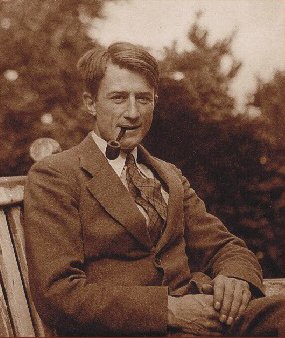Oakeshott and the American Founding
Many American conservatives view Michael Oakeshott with puzzlement. Although he is recognized around the world as a conservative thinker, a careful reading of his work yields the conclusion that he does not easily fit into the pantheon of famous conservatives. He described conservatism as a disposition, not as a platform or movement. He observed that it is not inconsistent to be conservative in politics but “radical in respect of almost every other activity.”
Perhaps most provocative of all is his indictment of the American Founding as quintessentially “Rationalist.” The early history of the United States, he wrote in his most famous essay, “Rationalism in Politics,” is “an instructive chapter in the history of the politics of Rationalism. . . . The Declaration of Independence is a characteristic product of the saeculum rationalisticum. It represents the politics of the felt need interpreted with the aid of an ideology. And it is not surprising that it should have become one of the sacred documents of the politics of Rationalism.”
This ought to be troubling for American conservatives, because Oakeshott saw Rationalism as the preeminent vice of modern politics. The Rationalist elevates abstract principles into the position of a guide, or set of instructions, for political activity. Politics is no longer the activity of people who know what to do because they have been educated in well-established norms and traditions. It is now an activity for dilettantes and amateurs, who think that ideology is enough to tell them which goods they should pursue, and how to pursue them. In following such ideologies, Rationalists make explicit use of written rules (constitutions, charters) that purport to specify certain unchanging truths, procedures, and grants and limitations of power.
In the mid-twentieth century, when Oakeshott wrote, there were many varieties of Rationalist politics to choose from: Marxism, National Socialism, Objectivism, and so on. Today we have our own variants: environmentalism, progressivism, anarchism, and the like. Even certain kinds of conservatism can qualify as Rationalist. So what is an American conservative to think, when faced with Oakeshott’s indictment of the American project as a quintessential example of Rationalism?
This is a motivating question for Gene Callahan’s excellent new book, Oakeshott on Rome and America. Nobody, to my knowledge, has ever before squarely taken on Oakeshott’s indictment of America as Rationalist, but this issue lies at the heart of Callahan’s inquiry. It is also of vital importance to any American conservative. To put it pointedly: If we are inclined to agree with Oakeshott’s criticisms of Rationalism as a wrong-headed approach to political life, must we turn these criticisms on ourselves—specifically, on our Declaration, Constitution and Bill of Rights, and all that has followed from the adoption of these founding documents? Is the United States, for all its aims of limiting government and separating power, as Rationalist as China or the former Soviet Union?
Callahan agrees with Oakeshott on the problems inherent in Rationalism, and would like to exempt the United States from this classification. At the very least, he thinks there is more to the issue than Oakeshott’s provocative comments would imply. Here is where the originality of Callahan’s thesis emerges. Most readers of Oakeshott would be inclined to imagine the following: if the founding of a country is Rationalist, then the practice and history of that country will also exhibit Rationalism. By the same token, if a country (like Britain or Rome) does not have a Rationalist founding, then its political practice will also not be Rationalist. But Callahan shows that the origin and subsequent practice of societies do not necessarily work in tandem. By way of illustration, he compares America to Rome.
America’s founding, argues Callahan following Oakeshott, would seem to be Rationalist in writing a constitution to bind all generations. It was as if, once ratified, the document itself could serve as a guard against departures from the letter of the law. On this reading, the writers of the Constitution appear to have placed excessive faith in governing by precept and in mere “parchment barriers,” as Madison so famously noted.
Yet as Callahan rightly observes, this written constitution was limited in its aims, leaving an expansive realm of freedom for individuals and states. It did not attempt to establish a utopia on earth, or to implement such modern utopian projects as income equality or universal healthcare. Power would be limited, constrained, checked; people would be protected from a government that desired to do too much. Ironically, limited government or “civil association” was the aim of a Rationalist founding.
By contrast, the Roman Republic emerged organically, and gradually, over many centuries. Rome had no explicit founding documents but was a thoroughly traditional society. Yet the Romans thought of themselves as “blessed by the gods . . . [their destiny was] to rule the world and impose a civilization and an orderliness upon its barbarisms.” This implies, for both Oakeshott and Callahan, a Rationalist conception of events or, put more precisely, what might be described as “the politics of faith.” In the politics of faith, political activity is seen as salvational, not limited, in its aims. Government officials are not neutral umpires but directors, teachers, even prophets and gods.
Callahan’s comparison between America and Rome thus highlights the difficulties of simply classifying societies as Rationalist or not-Rationalist. As Callahan repeatedly reminds his reader, Oakeshott is working in ideal types. Rationalists and conservatives, skeptical and faithful politics, civil and enterprise association: all of these are ideas, not persons or regimes. It would be as impossible to find an unalloyed Rationalist as it would be to discover a society that was wholly a civil association. And elements of both Rationalism and what Callahan terms “practical politics” inhere in every society, to varying degrees.
The implication of what Callahan has observed, however, is that Rationalist modes of thought and action have become unavoidable, even desirable, in contemporary political thought and activity. Indeed, he highlights the degree to which modern conservatives—even those most of us might admire for their vigorous defenses of freedom—have succumbed to its attractions. Oakeshott famously criticized Hayek for this, observing that “a plan to resist all planning may be better than its opposite, but it belongs to the same style of politics.” And Murray Rothbard, a vigorous defender of economic liberty, constructed his entire philosophic system on the Rationalist principle that certain rights, most notably property rights and “self-ownership,” were the indispensable starting point for all human conduct. If these starting points led to abhorrent conclusions, then so be it.
Careful readers, and particularly historians, might find things to quibble with in Callahan’s analysis, although he tends to anticipate these objections. One might ask whether Callahan has properly represented Roman history or whether, in focusing primarily on a single representative of American Rationalism (Thomas Jefferson), he might have overemphasized one tendency in the founding generation to the exclusion of others. Certainly these are legitimate and interesting questions in their own right, but they are not what make this book so compelling. The book is remarkable because it takes Oakeshott’s insights and applies them to questions of great contemporary relevance to Americans. These questions concern, above all, the character and limits of the United States Constitution.
To wit: Does our American Founding, despite its aim of limiting and checking the power of those who govern, exhibit an essentially Rationalistic tendency? In other words, are the self-evident principles and universal rights it proclaims really nothing more than a distillation of the inherited English political experience, parading as eternal truths? And even if they were considered eternal truths in 1776 or 1787, are they really so today? Callahan observes that if the political culture does not support such rights and limits, or if presidents, politicians and judges are intent on, to put it gently, reinterpreting them, then there is nothing at all to stop them from doing so.
Callahan observes that a written constitution will inevitably “be read in a way that conforms to the prevailing understanding of how government ought to operate and what powers it ought to possess.” This is not simply because living constitutionalists and progressives of all stripes have managed to gain majorities in important cases. It is because, argues Callahan following Oakeshott, no written constitution can do what it purports to do in terms of providing pointed and substantive barriers to political action, especially when majorities support such action. For such reasons even Originalism is unsupportable. The notion of grounding or stabilizing the meaning of the Constitution by recourse to “original intent” is, he observes, “not just a pipe dream today, but always was such.” In short, the political culture supports the Constitution; not the other way around. We need only look at the contemporary debate about marriage to see that this is true, whether we like it or not.
One final thought. Perhaps, it might be argued, Oakeshott is right in his arguments about political culture. Politics goes on as it will in a democracy so long as a majority is happy with the outcomes. Yet given the current debates over religious liberty, one wonders where we would find ourselves without the “protection,” or at least the threat, of the first Amendment against government overreach. It is one thing to find the provisions of the Constitution and Bill of Rights not totally adequate for the job; it is another thing to be without them altogether. All parties in the debates over enumerated rights at least acknowledge that the Bill of Rights must be taken into account.
But this is a question for another book. Gene Callahan’s current one, Oakeshott on Rome and America, is a lucid and provocative introduction to such issues.



